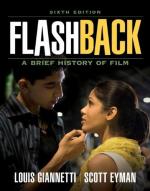
|
| Name: _________________________ | Period: ___________________ |
This test consists of 15 multiple choice questions and 5 short answer questions.
Multiple Choice Questions
1. Which of the following was not one of the most respected Japanese directors from the post-World War II era?
(a) Kenji Mizoguchi.
(b) Akira Kurosawa.
(c) Yasujiro Ozu.
(d) Toshiro Mifune.
2. What was France's main big screen hit in the 1970s?
(a) "Les Liaisons Dangerouse."
(b) "No Exit."
(c) "Madame Bovary."
(d) "La Cage aux Folles."
3. What region became renowned for their film adaptations of literary classics?
(a) Southern Japan.
(b) Eastern Europe.
(c) Scotland.
(d) USSR.
4. What was Italian director Luchino Visconti's title in his home country?
(a) The Duke of Modrone.
(b) The Baron of Sicily.
(c) The Baron of Venice.
(d) The Duke of Conti.
5. What British comedy troupe had a cinematic bright spot for their country's struggling film industry?
(a) Monty Python's Flying Circus.
(b) Are You Being Served?
(c) Kids in the Hall.
(d) Absolutely Fabulous.
6. Which European country's film industry was the most devastated after World War II?
(a) Germany.
(b) Italy.
(c) Spain.
(d) Greece.
7. Which of the following was not one of the most popular genres to emerge from Japan's film industry?
(a) Samurai films.
(b) Historical romance.
(c) Science fiction.
(d) Animation.
8. Which Eastern European country became a strong force in the international film community in the sixties?
(a) Siberia.
(b) Czechoslavakia.
(c) Yugoslavia.
(d) Russia.
9. Who replaced Czechoslovakia's government, obliterating their film industry?
(a) Soviet Union.
(b) Germany.
(c) Northern Africa.
(d) United States.
10. During the 1960s in Hollywood, what was the main focus in the industry's mainstream films?
(a) Political awareness.
(b) Glamour.
(c) Intrigue.
(d) International relations.
11. When Britain began to focus on literary and theatrical stage adaptations for their film industry in the years surrounding World War II, what renowned actor became particularly lauded for his work in this area?
(a) Laurence Olivier.
(b) Peter Sellers.
(c) Orson Welles.
(d) Alfred Hitchcock.
12. What became the focus of American cinema in the seventies?
(a) Historical accuracy.
(b) Plot.
(c) Music as a story-telling device.
(d) Character development.
13. What was significant about the marketing tactics of the American film studios in the eighties?
(a) Trailer editing rose as an art form.
(b) Patriotism was emphasized.
(c) Youth was repeatedly pushed aside.
(d) Stars were marketed aggressively.
14. Due to the cinema's reflection of the American public's distrust of the government, what began to happen to the movie theater?
(a) Attendance rose.
(b) Attendance declined.
(c) Theaters became segregated.
(d) Security had to be enforced in the theater.
15. What country nearly wiped out the French film industry after World War II?
(a) America.
(b) Italy.
(c) Britain.
(d) Germany.
Short Answer Questions
1. In France's New Wave, filmmakers experimented with mixing _____.
2. How did the end of the Vietnam War affect the content of American films?
3. What was significant about the economy in American films during the early to mid-eighties?
4. What was the focus of Italy's films in the years around World War II?
5. What popular American film from the eighties was one of the most successful mixes of both animation and live action?
|
This section contains 513 words (approx. 2 pages at 300 words per page) |

|




